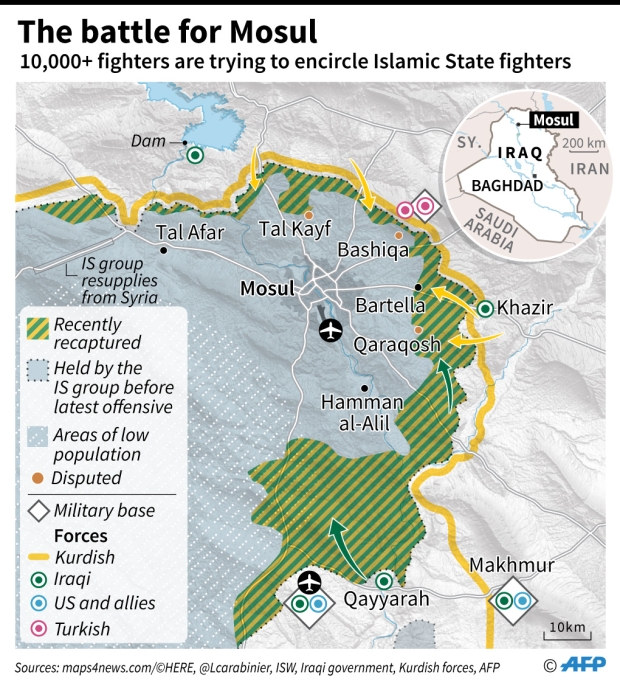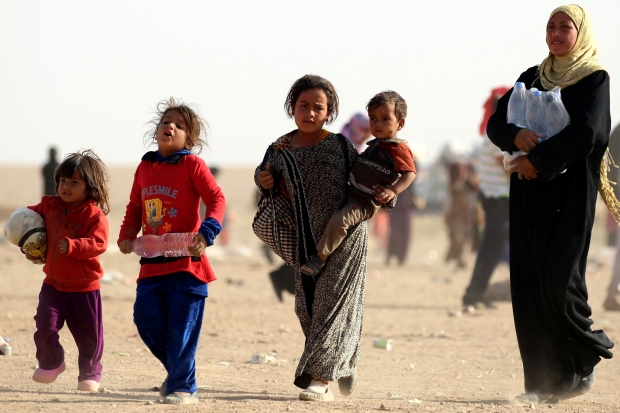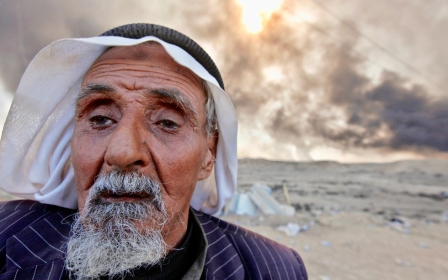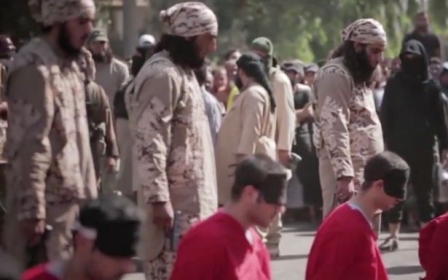Iraqi forces tighten noose around Mosul as Kurds capture Bashiqa
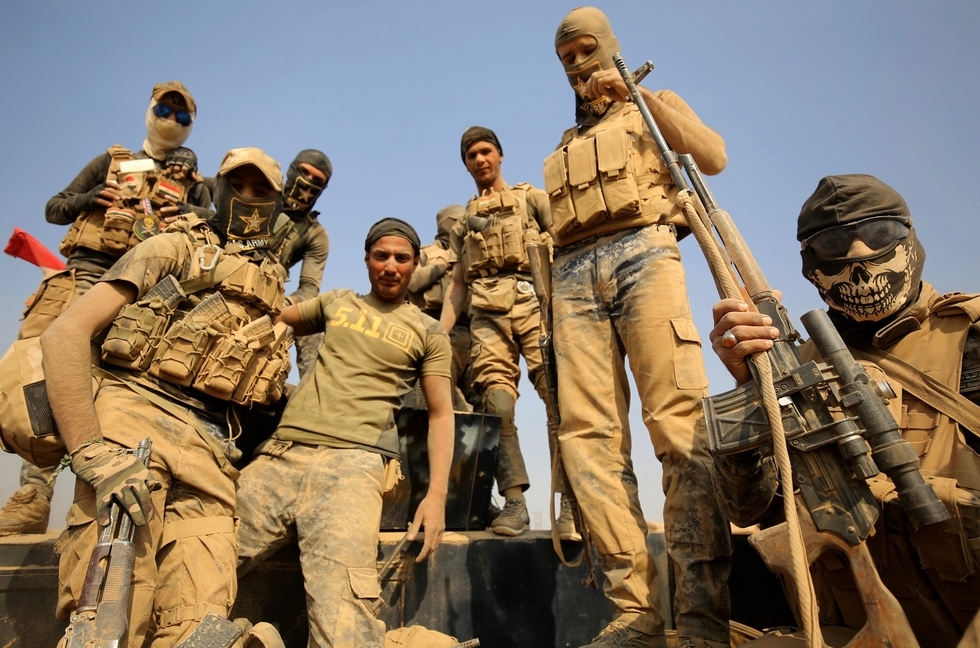
Iraqi forces battled on Sunday through traps, sniper fire and suicide car bombs to tighten the noose around Mosul, as Kurdish forces captured the Islamic State-held town of Bashiqa amid claims and counter claims they had asked for Turkish support.
Kurdish forces said late on Sunday that they had taken Bashiqa, northeast of Mosul, where some 10,000 fighters were engaged in a huge assault that began at dawn.
Turkey said the Kurdish peshmerga forces had requested assistance from its soldiers at a base near Bashiqa and it offered support with artillery and tanks.
Rudaw, the Iraqi Kurdish TV channel, quoted peshmerga commanders as saying they had not requested Turkish artillery support.
Ankara's claim came a day after Baghdad turned down a suggestion by visiting US defence chief Ashton Carter - who met Kurdish leader Massoud Barzani on Sunday - for Turkey to be given a part in the battle.
However, Iraq's joint operations command on Monday denied Turkey was participating in military operations to retake Mosul from IS.
"The spokesman of the Joint Operations Command denies Turkish participation of any kind in operations for the liberation of Nineveh," a statement said, referring to the Iraqi province of which Mosul is the capital.
Barzani, president of the Iraqi Kurdish region, told Carter that the Kurds had succeeded in liberating Bashiqa from the Islamic State (IS) group.
Kurdish Peshmerga fighters told reporters at the scene that they had entered Bashiqa. Journalists were not yet allowed into the town, which lies 12km northeast of Mosul.
The capture of Bashiqa, if confirmed, would mark the removal of one more obstacle on the road to the northern city.
The top US commander in Iraq, Army Lieutenant General Stephen Townsend, said his own information - while limited - "suggests that President Barzani is right, that there has been a considerable success at Bashiqa".
He added: "I have not received a report that says every house has been cleared, every Daesh (IS) has been killed and every IED (roadside bomb) has been removed."
IS-fortified village
Townsend told journalists that Bashiqa was one of the villages outside Mosul that IS had emptied of civilians and fortified over the past two years.
As Peshmerga forces moved through the area, armoured vehicles moved along a road and a helicopter flew overhead.
The Peshmerga are also using tanks, rocket launchers and snipers. A Reuters photographer saw the fighters destroy at least three suicide car bombs dispatched against their forces.
Turkish artillery is supporting the Peshmerga, Turkish Prime Minister Binali Yildirim was quoted as saying by CNN Turk and other media outlets.
"The Peshmerga have mobilised to cleanse the Bashiqa region from Daesh. They asked for help from our soldiers at the Bashiqa base. So we are helping the tanks with our artillery there," CNN Turk quoted him as saying.
Turkey has troops at a base in the area where it has been helping train Iraqi Kurdish fighters. The artillery support may further strain relations between Ankara and the Baghdad central government, coming a day after Abadi had declined Turkey’s offer to take part in the Mosul campaign.
Launched last Monday, the Mosul assault aims to reclaim the last major Iraqi city under IS control, dealing another setback to the militants' self-declared "caliphate" in Iraq and neighbouring Syria.
Diversionary attacks
The militants hit back on Friday with a surprise assault on the Kurdish-controlled city of Kirkuk and two days later security forces were still tracking down fighters involved in the attack.
The dozens of attackers, including several suicide bombers, failed to seize control of key government buildings but sowed chaos in Kirkuk, a large oil-rich and ethnically mixed city.
At least 51 of the militants had been killed, including three more on Sunday, local security officials said.
At least 46 people, most of them members of the security forces, were also killed in the raid and ensuing clashes, which had almost completely stopped by Sunday evening.
Life was returning to normal in some parts of the city but security forces were deployed in southern neighbourhoods where several gunmen were still actively being hunted.
IS militants also attacked Rutba, a remote town near the Jordanian border in the western province of Anbar, with five suicide car bombs, the area's top army commander said on Sunday.
The attackers briefly seized the mayor's office, but security forces quickly regained the upper hand, he said.
The spectacular attack in Kirkuk, of a type observers warned may happen more often as IS loses territory and reverts to a traditional insurgency, temporarily drew attention away from Mosul.
But there was no sign it had any significant impact on the offensive to retake the city, Iraq's largest military operation in years.
Tens of thousands of fighters, including Iraqi federal troops and Kurdish Peshmerga, are taking part in the assault.
Engaged on the northern and eastern fronts, the Peshmerga are expected to stop along a line at an average of 20km from the boundaries of the city proper.
"They are pretty much there," a US military official said on Saturday, adding that the lines "will be solidified in the next day or two".
The Peshmerga announced they had secured eight villages near Bashiqa.
Elite federal forces were also fighting to retake control of Qaraqosh, which lies just east of Mosul and used to be the largest Christian town in Iraq.
Townsend said on Saturday that IS resistance was stiff.
"It's pretty significant, we are talking about enemy indirect fire, multiple IEDs, multiple VBIED (vehicle-borne IEDs) each day, even some anti-tank guided missiles," he said in Baghdad.
Iraqi Kurdish and federal forces rarely release casualty figures, but hospitals behind Kurdish lines were overwhelmed by the number of wounded, an AFP reporter said.
Heavy casualties
"We have a shortage of human resources, medical equipment, medicine and specialised doctors," Lawand Meran, a doctor at Erbil West hospital, said.
"Soon, if we have 1,000 casualties, our capacity will not be enough."
US military officials have revised their estimate slightly upward for the number of IS militants in and around Mosul.
They believe IS is defending Mosul, where the "caliphate" was proclaimed in June 2014, with 3,000 to 5,000 fighters inside the city and 1,000 to 2,000 in the outskirts.
There is deep concern for an estimated 1.2 million civilians still believed to be in the city.
Several thousand civilians fleeing the fighting have escaped to camps for the displaced south of Mosul.
"Over 5,000 people are currently displaced and in need of humanitarian assistance," the United Nations said in an update on Sunday.
"Population movements are fluctuating as the front lines move, including people returning to their homes following improved security conditions in the immediate area," it said in a statement.
Iraqi forces are now fighting in sparsely populated areas but when they near the limits of the city itself aid groups fear the start of a huge exodus.
A million people could be displaced, sparking an unprecedented humanitarian emergency in a country where more than three million people have already been forced from their homes since the start of 2014.
This article is available in French on Middle East Eye French edition.
New MEE newsletter: Jerusalem Dispatch
Sign up to get the latest insights and analysis on Israel-Palestine, alongside Turkey Unpacked and other MEE newsletters
Middle East Eye delivers independent and unrivalled coverage and analysis of the Middle East, North Africa and beyond. To learn more about republishing this content and the associated fees, please fill out this form. More about MEE can be found here.


